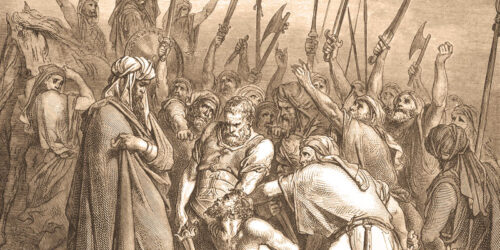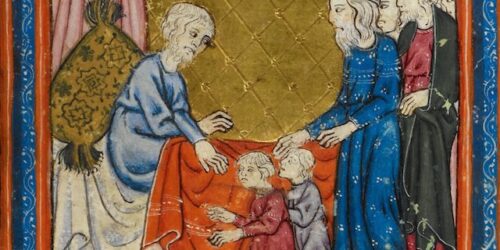Then Judah said to his father Israel, “Send the boy in my care, and let us be on our way, that we may live and not die – you and we and our children. I myself will be surety for him; you may hold me responsible; if I do not bring him back to you and set him before you, I shall stand guilty before you forever. For we could have been there and back twice if we had not dawdled.”
43:9
(Judah) meant that as long as he would live on earth he would consider himself as having sinned against his father.
Rabbeinu Bachya (13th Century)
Why did Jacob refuse to accept Reuben’s proposal, seeing he knew quite well that sooner or later the brothers would be forced to undertake a second journey to Egypt? What new dimension did Judah’s proposal contribute which moved his father to approve of their journey?…Judah’s guarantee is different from Reuben’s in that he himself offers to be the guarantor, not merely his sons.
Akedat Yitzchak (15th Century)
Concerning Benjamin’s personal safety en route to Egypt Yehudah said: “send the lad with me,”… When Judah had failed to elicit a positive response from his father he added that he would personally guarantee Benjamin. When he had said previously “send the lad with me,” he had meant; “send him with us;” however, he implied that he would be responsible for his safety as a guarantor over and above the brothers’ collective responsibility for Benjamin’s welfare and safety…Judah made it plain that his guarantee included the return to Benjamin alive and well…possibly, up tot hat point, Jacob had suspected Judah as having had a part in Joseph’s disappearance…
Moshe Alshich (16th Century)
And I shall stand guilty before my father for ever. This phrase is quite precious, since it points to something not explicitly stated in the Torah, which is that there is no punishment but the sin itself. For Divine justice, the sin is itself the punishment – and it takes the place of reward and punishment, that is why Judah says, And I shall stand guilty [literally stand in my sin] before my father for ever.
(R. Eliyahu ben Amzug, Em Lamikra) (19th Century)
(Judah has pierced Joseph’s deception to recognize that the Grand Vizier standing before them is none other than their lost brother) Let us clearly examine the development of Judah’s argument…Benjamin is about to be imprisoned. Judah, who had promised is father that he would be responsible for Rachel’s youngest, steps forward…Apparently, Judah is interpreting the catastrophic treatment suffered by the brothers as God’s punishment for their sale of Joseph. Hence Judah offers collective punishment. But the Grand Vizier wants only Benjamin…Apparently the brothers weren’t being punished by God for their cruelty toward Joseph; after all, Benjamin had never been part of the conspiracy…Judah’s new found awareness as to what was happening, and exactly who was the Grand Vizier!…Judah recalls that Simon, the brother with the most blood on his hands, was singled out to sit in prison…He also remembers how, upon their second visit, the Grand Vizier arranged their seats according to their ages. Only two other people could have known the proper ages of the brothers; father Jacob and brother Joseph…Jacob’s tragedy was his sin of deception before his father when he posed as Esav, perversely continued by Joseph’s pose as Egyptian Grand Vizier; Judah’s mastery is his gift of cutting through the deception.
Shlomo Riskin (contemporary)







